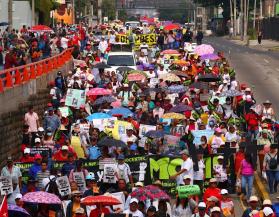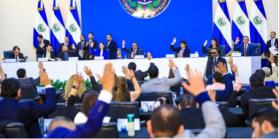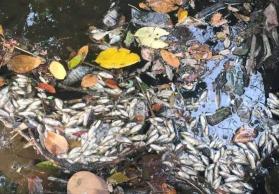US Treasury authorizes economic sanctions against the Mara Salvatrucha
On October 11, the US Treasury Department announced they were adding the Mara Salvatrucha (also known as the MS or MS-13) to their list of the most dangerous Transnational Criminal Organizations (TCOs). The list was created last year as part of President Barack Obama’s National Strategy to Combat Transnational Organized Crime and until now, only four organizations were designated as TCOs: the Italian mafia group the Camorra, Japan’s Yakuza organized crime syndicate, the Brother’s Circle criminal group which has members throughout the former Soviet Union, and the Mexican drug cartel Los Zetas.
Refugees of El Salvador’s Civil War founded the MS in Los Angeles in the late 80s in order to defend themselves from other Los Angeles street gangs. In the 90s the US government began a more aggressive deportation program and deported MS members spread the gang throughout Central America, where it took root among the large populations of youth living in poverty with no employment opportunities.
The MS is the first street gang to be given TCO designation, which allows the federal government to freeze assets associated with it and to prohibit banks from processing transactions associated with it. According to the Treasury Department, “One of the key goals of the President’s National Strategy is to attack the economic power of TCOs and protect the integrity of international markets and the U.S. financial system from TCO penetration and abuse.” The Daily Beast reports that Treasury Department spokespeople were unable to provide data about how much money associated with the MS is moving through the US.
During his weekly radio program, El Salvador’s President Mauricio Funes said he thought the US government was exaggerating the MS’ power “in the sense that it overestimates the economic and financial risk posed by the MS’ criminal actions.” MS members use threats, sometimes carried out, of violence or murder to charge residents and businesses in their territories a fee known as la renta; the quantities of money they move, said Funes, do not compare to the millions of dollars moved by drug cartels like Los Zetas. Freezing the gang’s assets “seems fine to me,” he said, but would do nothing to resolve a problem rooted in “social exclusion and poverty.
El Salvador’s Minister of Public Security, retired General Munguía Payés, also referred to the Treasury Department’s measure in statements to the press. He assured the public it would not affect the non-violence pact signed by leaders of the MS and its main rival the 18th Street gang in March that has resulted in a significant drop in the country’s murder rate and that the Funes administration is promoting internationally as a solution to El Salvador’s gang problem.
The Treasury Department’s designation not only comes in the midst of the gang truce, but also at a time when the US is increasing its security aid to Central America to fight the War on Drugs, recycling a militarization strategy that has failed in Mexico and Colombia while adding to the profits of US defense contractors. A possible explanation for the TCO designation of the MS could be the justification of this increased aid.
At this time many things related to the measure remain unclear: how the US government plans to use it against the MS and its members, what impact it will have in El Salvador on the current gang truce and reduction in murder rates, and what role it will play in the US’ increased involvement in Central American security policy.

 "I am a CISPES supporter because continuing to fight for social justice and a more people-centered country means continuing the dream and sacrifice of thousands of my fellow Salvadorans who died for that vision.” - Padre Carlos, New York City
"I am a CISPES supporter because continuing to fight for social justice and a more people-centered country means continuing the dream and sacrifice of thousands of my fellow Salvadorans who died for that vision.” - Padre Carlos, New York City

